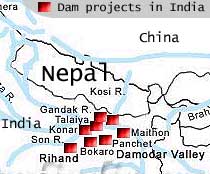Buddha's
Birthplace Threatened by Dam
The Associated Press
KATMANDU, Nepal (AP)
-- Nepal has asked India to stop building a dam that threatens to flood Buddha's
birthplace.
 Nepal formally
requested India to "stop the construction of the barrage,'' Minister for Water
Resources Bijaya Gachchedar said Tuesday.
Nepal formally
requested India to "stop the construction of the barrage,'' Minister for Water
Resources Bijaya Gachchedar said Tuesday.
Four months ago, India
began building the Rassiyal-Khurda-Lautan dam across the Danav River, just 655 feet from
the Nepal-India border south of Lumbini.
Lumbini, 170 miles
southwest of Nepal's capital of Katmandu, is where Buddha was said to have been born more
than 26 centuries ago as Gautama Siddhartha. UNESCO, the United Nations' cultural arm, has
recognized Lumbini as the birthplace of Buddha and declared it a World Heritage Site.
The dam is meant to block
and manage the flow of river water, mainly for irrigation, Indian officials have said.
The 20-foot high dam has
come under fire from Buddhist scholars and Nepalese political parties. They accuse
Hindu-dominated India of violating international laws that bar such constructions within
five miles of an international border.
"The construction of
this barrage is a well-designed conspiracy of India to inundate the birthplace of Lord
Buddha and create another fake Lumbini somewhere in the Indian territory,'' said lawmaker
Gokarna Bista of the United Marxist Leninist Communist Party of Nepal.
India has long claimed
the actual birthplace of Buddha is in India and not Nepal. However, archeologists
discovered in 1996 a commemorative pillar placed there by the Indian Emperor Ashoka in 249
B.C. that marked the precise location.
UNESCO has said that
Lumbini is one of the holiest places of one of the world's great religions, and its
remains contain important evidence about the nature of Buddhist pilgrimage centers from a
very early period.